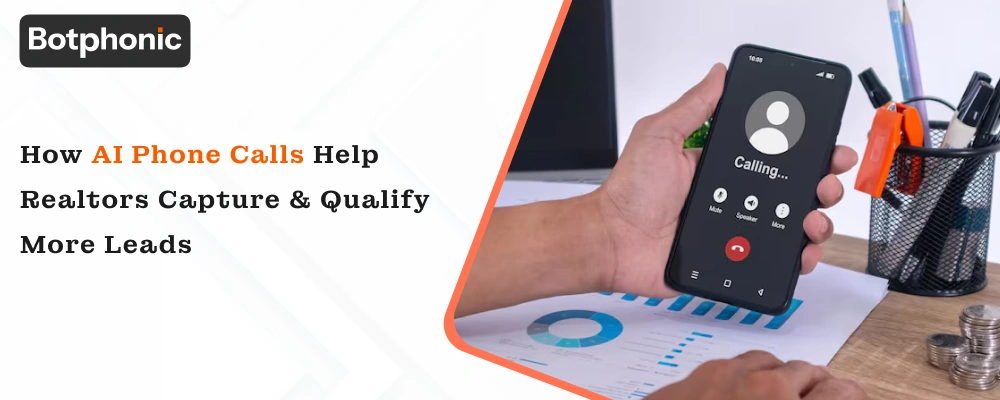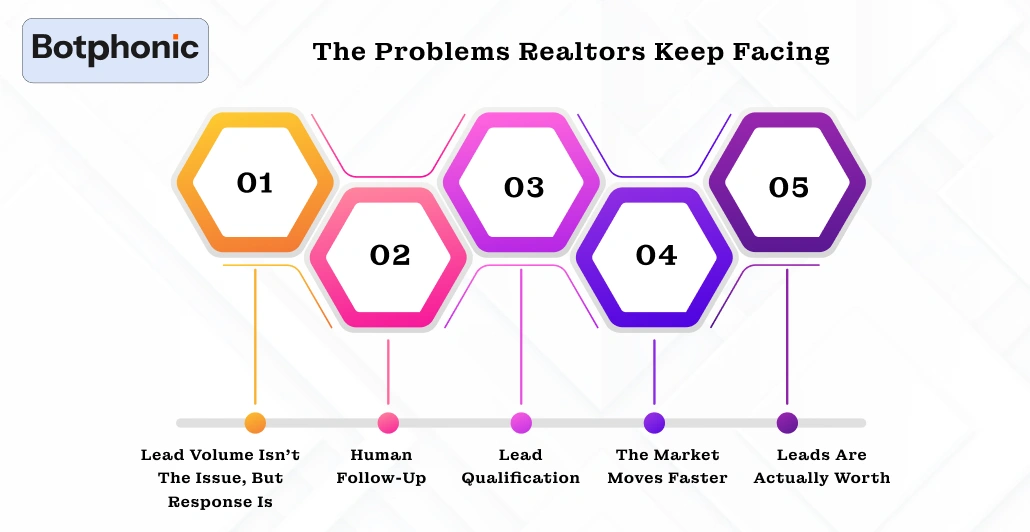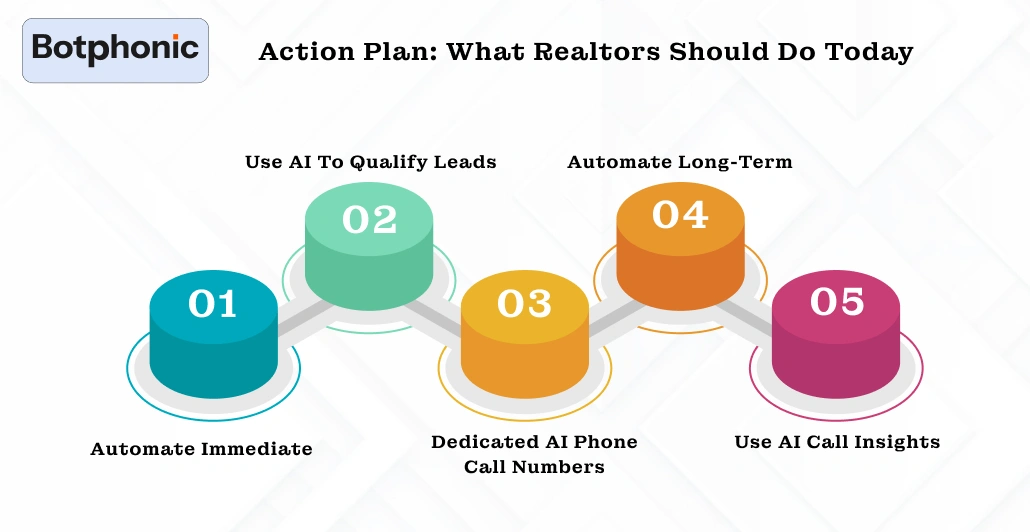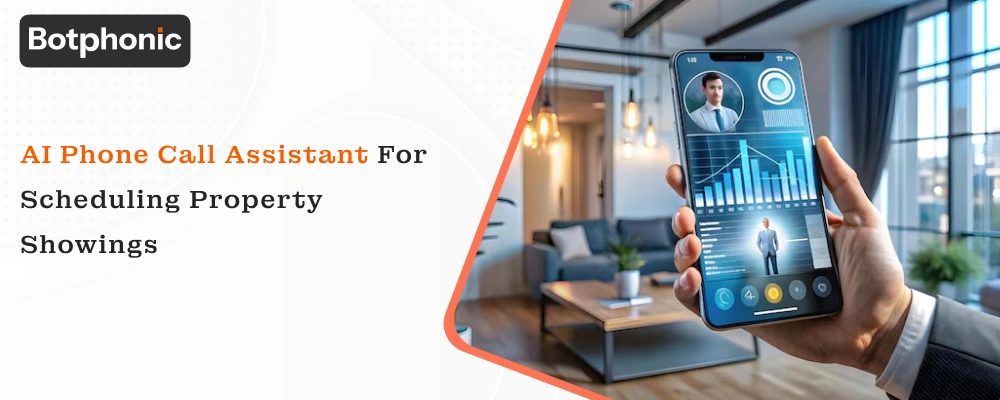
Summarize Content With:
Quick Summary
AI phone calls for real estate leads have now become the new trend for realtors. This industry is now running on speed, consistency, and intelligent follow-up. With AI-powered calling systems, realtors are now able to contact new inquiries, qualify prospects in real time, and even maintain long-term engagement.
In this article, we will be breaking down how AI phone calls help realtors capture and qualify more leads, why technology is advancing, and how one can roll it into the operation without turning the team into beta testers. You can just consider it practical without adding any nonsense.
Introduction
The real estate industry has been a contact sport. Deals don’t really happen until conversations happen. And, traditionally, it actually meant long hours on the phone, dialing through lists, leaving voicemails, and even praying that leads pick up the call before heading to another agent. But let’s not glorify it; the traditional phone game is now buckled under modern lead expectations. Buyers are now expecting instant answers, and sellers want on-demand updates. And most importantly, even agents want more hours in the day.
Entering the new heavyweight on the block: AI phone calls, which are powered by AI call assistants, AI phone call automations, and even advanced models that can analyze phone call content and customer intent. Even decades ago, it might have sounded like Silicon Valley daydreaming. And today, it’s table stakes for brokerages that intend to survive the next decade.
Why AI Phone Calls Are Reshaping Real Estate Lead Capture
For years, the methods haven’t changed much. Agents had to hope to get leads, follow up, hoping their call cadence is keeping it relevant long enough to win the client. But the market today is operating at a different tempo. Some notifications ping buyers instantly and allow sellers to track local market stats in real time. Consumers are expecting answers with the same immediacy that they are getting from e-commerce brands.
If someone is still treating lead response as “when I get around to it” duty, they are just permitting leads to slip through their fingers. And allow us to show you the harsh truth of real estate:
Real estate’s biggest challenge is not just about generating leads but responding to them fast enough.
Real estate teams are now just drowning in inbound opportunities, but they are losing conversation points just because they aren’t able to respond to them within the golden window. It’s no longer a resource issue but has become a structural one. Manual calling is not really recognized for scaling, and even the most disciplined team can break down when there’s unmanageable pressure and a sudden surge in leads.
And undoubtedly, this is where AI phone call technology enters and offers the necessary structural upgrade.
The Problems Realtors Keep Facing

Realtors aren’t failing because they lack talent, but the reason they are failing is that they are fighting the same operational headaches year after year. They are armed with tools, but they are outdated and typically driven by hope. But today the industry has changed, but pain points haven’t, at least not for those who are still using a traditional playbook.
Let’s get the reality check that most brokerages already know but might not have really said out loud.
1. Lead Volume Isn’t the Issue, But Response Is
Every realtor is asking for “more leads”, but let’s get real, many realtors can’t even handle the leads that they already have. Between showings, inspections, paperwork, and the general chaos of real estate, responding to a new inquiry within the critical five-minute window is impossible without an AI phone call for real estate leads. And as minutes pass, so do the conversion odds.
The modern buyer has zero patience to simply wait for a follow-up. They’ll just think of calling the next agent on the list and even forget that they have ever called you.
2. Human Follow-Up is Inconsistent at Best
Even the most disciplined teams might fall short. Whatever the profession is, even the realtors are human; they also get busy, tired, distracted, or even might be juggling multiple tasks at once. There’s just no shock that follow-up procedures have become so sporadic.
- Missed callbacks
- Forgotten re-engagement
- “I’ll call them later” syndrome
- Leads left sitting in CRMs are just like digital dust collectors.
It’s not even a motivation problem, but a bandwidth problem.
3. Lead Qualification Is a Time Sink
Agents are spending an absurd amount of time just chasing people who:
- Aren’t looking to buy soon
- Don’t have financing
- Are “just looking”
- Want information but not a relationship
- Have unrealistic expectations
You are not going to recapture those missed hours. And the opportunity cost is just so brutal: high-intent buyers are getting delayed attention while low-quality leads are just draining your pipeline.
4. The Market Moves Faster Than the Team Can Respond
Consumers are expecting instant answers, but agents are obviously operating at human speed. You can see the gap clearly. When a buyer inquires about a listing, the clock is obviously not measured in hours. Now, your time is getting measured in seconds, and manual calling is not just meant for it. Today’s demand for immediacy requires something that can fulfil this.
5. No Clear Picture of What Leads Are Actually Worth
Many teams just work blindly when it comes to determining lead value. With inconsistent tracking and patchy data, leadership can’t just answer:
- Which campaigns bring in real buyers?
- Which leads to wasting the most time?
- What channels deliver the highest ROI?
Without any clean data, the strategy just becomes guesswork.
What an AI Phone Call Really Is (Without Exaggeration)
Let’s make it clear, an AI phone call is not just a robot voice that’s reading a script. That ship has already sailed years ago. Modern systems are now handling the chaos with:
- Natural speech patterns
- Context-based responses
- Emotion and sentiment detection
- Multi-intent understanding
- Long-form conversations
- CRM-triggered workflows
You can just think of it as an always-on call rep who isn’t taking any breaks and never forgets to take follow-ups.
This Technology Consists Of Multiple Components
1. AI Phone Call Automation
This technology takes care of triggering outbound calls automatically, managing inbound calls, determining the flow of conversations, and updating your CRM with the data that is synced.
2. AI Call Assistant
This is like a digital ISA performing functions such as engaging leads, answering queries, collecting data, booking appointments, and passing on the hot leads to the agents.
3. AI Phone Call Number
Unique numbers are assigned to specific campaigns so that you can track leads precisely and see which marketing dollar is bringing in the most business.
4. AI Voice Changer Phone Call Technology
Newer technologies offer the possibility of tone, pacing, and vocality changes. A few even have the capability to impersonate the voices of the brand or adjust to the customer’s demography. Some may find it creepy; others will see it as a time-saver.
5. AI to Analyze Phone Call Content and Customer Intent
This is a powerful feature. Such systems analyze the discussions as they happen—detecting buying signals, hesitations, timelines, budgets, and sentiments.
Putting this in a business context: the process involves not only automation but also taking intelligence as an add-on to operational discipline.
How AI Phone Calls Help Realtors Capture Leads?

This is the core of the discussion, so let’s just get into it, and obviously, we are going to do so with an operational lens.
1. Zero-Delay Lead Responses
Speed is something that never disappoints. Every study made confirms it. Leads contacted within five minutes are more likely to convert than others who aren’t contacted. But there’s something even you can’t seem to catch, right? Between showings, inspections, listing appointments, and life, an immediate response is just way too unrealistic for humans. But with AI phone calls for real estate leads, you can easily make it.
AI doesn’t even blink. With AI phone call for real estate leads, the second a lead registers on your site, portal, landing page, or even ad, they will receive an automated yet natural-sounding phone call that initiates by validating interest, capturing details, and even filtering out the junk.
2. Authentic and Two-Way Conversations
Forget the rigid bits of old days, these days AI call assistant are designed to sound like a well-trained staff. They can easily:
- Ask clarifying questions
- Navigate branching tips
- Recover gracefully whenever there’s confusion
- Acknowledges the caller’s emotions
- Provide consistent messaging
It’s not about the awkward robot voices anymore that ask you to “Press 2 for options.” It has been designed to behave more like a rep who is way too enthusiastic to help you and just blissfully efficient at their job.
3. Built-In Lead Qualification
AI can easily analyze phone call content and customer intent mid-conversation. But if someone says:
- “We’re looking to buy it in the next 30 days.”
- “We need to sell before we purchase.”
- “I’m relocating for work.”
The AI will flag it as high-intent data, tag it, and push the lead directly to the top of the agent’s priority list.
It also identifies tire-kickers with its efficient ability of accuracy.
4. Reliable Follow-Up
Follow-up is where real estate dreams are going to work. Human inconsistency is the enemy of reliable follow-up. AI phone call automation ensures that follow-ups happen:
- On time
- At the right cadence
- With consistent messaging
- With zero complaint fatigue
If someone ever needs six nurtures over the next 60 days, AI executes. Without any excuses.
5. Human Agents Only Handle What Matters
We all know that the job of a realtor is divided into many parts: it’s part sales, part therapist, part local economist. But cold calling or unqualified leads. You can say it’s just operational busywork.
With AI filtering out noise, agents spend time on:
- Listing appointments
- Serious buyers
- Contracts
- Negotiations
- High-intent conversations
To say it simply, you can say that it’s the work that actually pays for itself.
Core Use Cases: Transforming Real Estate Teams
AI phone calls provide not only speed but also a complete overhaul of the entire process.
1. Lead Response & Qualification
AI is responsible for:
- Property inquiries are coming in from different sources
- Returning calls for leads from online portals
- Making phone calls to those who registered on the website
- Following up on the open house
- Screening potential sellers
AI is able to tell whether a person is serious or just checking prices.
2. Appointment Scheduling
The AI phone assistant schedules appointments automatically taking into consideration:
- The availability of the agent
- The importance of the lead
- The location
- The type of property
No more “I have to check my schedule and get back to you.”
3. Long-Term Nurture
AI performs lead periodic check-ins with those who expressed future intent:
- “Our lease ends soon, and we are waiting.”
- “Down payment savings are our priority.”
- “We’ll see what’s out there once the kids are out of school.”
Most agents forget these chats. AI, on the other hand, has a perfect memory.
4. Transaction Coordination Support
Over the phone, imagine getting feedback from the showings automatically, and getting reminders about lender documents, scheduling inspections, and getting updates on closing, all through automated calls. This isn’t science fiction; it’s simply a step towards operational maturity.
Action Plan: What Realtors Should Do Today

With this action plan, you can actually capture more leads and qualify them with precision using AI. As per recent studies of Morgan Stanley, there are upto 37% of tasks that can be automated in the real-estate industries.
1. Automate Immediate Lead Response
Deploy an AI phone call automation that will ensure that every new lead is contacted that too within a few seconds. There won’t be any exceptions any longer. Instant engagement will stop competitors from looting you of opportunities, even before you get the gist of it.
2. Use AI to Qualify Leads Before Agents Step In
Let the AI phone call assistant handle the initial work of discovering details. For instance, budget, timeline, location, motivation, or any other details you might require. It will help you filter out the data and ensure that the team is only spending its time on genuine and high-intent prospects.
3. Track Every Channel With Dedicated AI Phone Call Numbers
Ensure to assign unique AI phone call numbers to your different portals. Such as Google Ads, portals, and even your website. It will help you provide clean data on what’s generating results and what’s just there to drain your budget.
4. Automate Long-Term Follow-Up
You can make AI supervise nurturing of leads for some days, maybe for about 30, 60, 90, and 180 days. It’s not always that people convert on day one. Consistent touchpoints via automated AI phone calls for real estate leads will help you win deals that humans might have forgotten about.
5. Use AI Call Insights to Guide Agent Focus and Strategy
You can just rely on AI to analyze phone call content and customer intent, which provides sentiment cues, urgency markers, and also conversation summaries. Agents can easily get sharper, faster, and more effective because they walk into every call that’s already prepared.
Every realtor should just accept the truth: your competition is no longer the agent just down the street. Your own operational bottlenecks are stopping you from getting the deal. This action plan is how you get the deal and get ahead of your competitor and bottleneck.
Implement these steps, and you’ll respond faster, convert more, waste even less time than before, and most importantly, you’ll grow without any chaos.
Schedule a Demo to See AI in Action.
Try Now!!Conclusion
AI phone calls aren’t just another tool; they have become the structural upgrade that the real estate industry has long awaited. The truth is just simple: agents are not losing business because they aren’t good at sales, but they are losing because they have been stuck dealing with those outdated workflows. They are just not able to keep up with modern lead expectations.
With an AI phone call for real estate leads managing the immediate response, qualification, follow-up, and long-term nurturing, realtors might finally get something priceless, that is, time. Time is required to negotiate, to build relationships, to win listings instead of chasing.
The agents and brokerages that have embraced AI-powered phone systems will surely dominate the upcoming decade. Everyone else might just be left juggling missed calls and wondering what’s keeping them from getting the lead. The change isn’t even optional anymore; it’s the new operating standard for anyone serious about growth.

